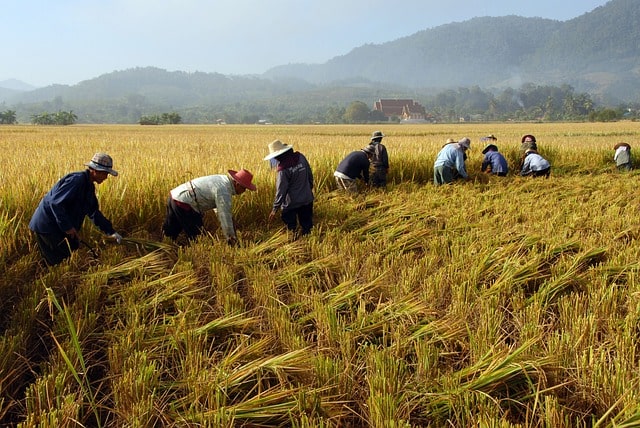

The Minimum Support Price (MSP) is a crucial mechanism through which the government supports farmers by purchasing their crops at a pre-determined price.
Annually, the Government of India announces MSPs for 22 major agricultural commodities, including 14 Kharif crops, 6 Rabi crops, and 2 commercial crops.
In addition, MSP for Toria and de-husked coconut is also fixed based on MSPs of rapeseed & mustard, and copra, respectively.
Government fixes Minimum Support Prices (MSPs) for 22 mandated agricultural crops based on the recommendations of the Commission for Agricultural Costs & Prices (CACP), after considering the views of State Governments and Central Ministries/Departments concerned and other relevant factors.
While recommending MSP, CACP considers various factors viz. cost of production, overall demand-supply situations of various crops in domestic and world markets, domestic and international prices, inter-crop price parity, terms of trade between agriculture and non-agriculture sector, likely effect of price policy on rest of economy and a minimum of 50 per cent as the margin over the cost of production.
The production cost computed by CACP includes all paid-out costs such as those incurred on account of hired human labour, bullock labour/machine labour, rent paid for leased land, expenses incurred on use of material inputs like seeds, fertilizers, manures, irrigation charges, depreciation on implements and farm buildings, interest on working capital, diesel/electricity for operation of pump sets etc, miscellaneous expenses and imputed value of family labour.
Aligned with the commitment outlined in the Union Budget 2018-19, the Government has consistently raised MSPs to ensure they are set at least 50 per cent above the All India weighted average Cost of Production.
Notably, this calculation includes considerations such as family labour, acknowledging the collective efforts of entire farming households rather than solely focusing on individual farmers.
On June 19, 2024, the Union Cabinet chaired by Prime Minister Shri Narendra Modi approved the increase in the Minimum Support Prices (MSP) for all mandated Kharif Crops for Marketing Season 2024-25.
The highest absolute increase in MSP over the previous year has been recommended for oilseeds and pulses viz. nigerseed (Rs.983/- per quintal) followed by sesamum (Rs.632/- per quintal) and tur/arhar (Rs.550/- per quintal).
Comparative Analysis of MSP for Kharif Crops in last 5 years
The Minimum Support Price (MSP) data for various cereals over the past five years indicates a consistent upward trend.
From 2020-21 to 2024-25, the MSP for Paddy (Common) rose from 1868 to 2300, while Paddy (Grade A) increased from Rs.1888 to Rs. 2320. Among the cereals listed, Ragi has seen the highest increase in MSP over the past five years.
Its MSP rose from Rs.3295 in 2020-21 to Rs.4290 in 2024-25, reflecting a significant increase of Rs.995. This substantial rise highlights the government's focused effort to promote and support the cultivation of Ragi, recognizing its nutritional benefits and importance in food security.
Over the past five years, the MSP for pulses has also shown a consistent upward trend. Specifically, Tur (Arhar) saw its MSP increase from Rs.6000 in 2020-21 to Rs.7550 in 2024- 25. Moong's MSP rose from Rs.7196 to Rs.8682 during the same period. Urad also experienced a steady rise from Rs.6000 to Rs.7400.
Among these, Moong exhibited the maximum increase in MSP, climbing by Rs.1486 in the last 5 years. This significant rise underscores the government's efforts to support and incentivize the production of Pulses.
Also, during the past five years, the Minimum Support Prices (MSP) for various oilseeds have also exhibited a significant upward trend, with an increase in the MSP of Groundnut from Rs.5275 in 2020-21 to Rs.6783 in 2024-25.
Sunflower Seed's MSP rose from Rs.5885 to Rs.7280 over the same period, while Soyabean (Yellow) experienced a steady rise from Rs.3880 to Rs.4892. Sesamum's MSP increased substantially, from Rs.6855 in 2020-21 to Rs.9267 in 2024-25, and Nigerseed saw its MSP rise from Rs.6695 to Rs.8717.
Among these oilseeds, Sesamum showcased the maximum increase, with its MSP rising by Rs.2412 over the five years. This sharp rise underscores the increasing value and demand for Sesamum in the market.
The Minimum Support Prices (MSP) for commercial crops such as Cotton have seen a significant rise over the last five years. For Cotton (Medium Staple), the MSP increased from Rs.5515 in 2020-21 to Rs.7121 in 2024-25.
Similarly, Cotton (Long Staple) saw its MSP rise from 5825 to 7521 over the same period. This substantial rise in MSP for both varieties underscores the growing value of cotton in the agricultural sector and the government's focus on enhancing the profitability of commercial crop cultivation.
The increased Minimum Support Prices (MSP) for the 2024-25 Kharif season by the Union Cabinet signifies a robust commitment to bolstering the agricultural sector and ensuring the economic well-being of farmers.
This year's significant hikes, especially for oilseeds and pulses, underscore the government's focus on enhancing profitability and sustainability in farming.
By setting MSPs at least 50 per cent above the cost of production, the government acknowledges not only the hard work of individual farmers but also the collective efforts of entire farming families.
This strategic move is poised to strengthen India's agricultural foundation, promote food security, and contribute to the overall economic growth of the nation.
(This article is co-authored by four agriculture experts -Santosh Kumar, Sarla Meena, Ritu Kataria & Apoorva Mahiwal)